Showing top 0 results 0 results found
Showing top 0 results 0 results found

Twilio has become a capstone in customer service because of its versatility and range of applications. However, every tool has its challenges.
As customer expectations rise, it is a good idea to explore alternatives to Twilio that offer upgraded features, more integration options, and a more user-friendly experience.
This article compares top alternatives, highlighting software that uses AI technology to quickly and accurately respond to customer inquiries.
Overview of Twilio
Twilio, founded in 2008, revolutionized how businesses communicate with their customers by offering a cloud-based platform enabling developers to build, scale, and operate real-time communications within their software applications. With its comprehensive suite of APIs for SMS, voice, video, and other communication media, Twilio quickly became a cornerstone in the tech stacks of many companies looking to enhance their client engagement.
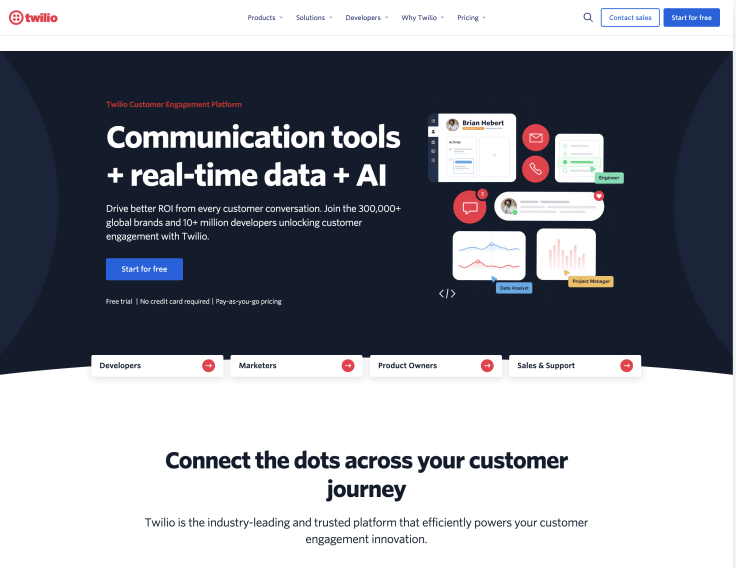
Key features and benefits
Twilio offers multiple benefits. Its highly scalable APIs allow companies to handle increased communication loads without compromising performance. Twilio's global reach ensures reliable connectivity across regions while solid security measures protect data.
Let’s take a closer look at some of the features:
- Programmable messaging: Send and receive SMS, MMS, and WhatsApp messages worldwide.
- Programmable voice: Make, receive, and monitor calls globally with high-quality voice communications.
- Video API: Embed real-time, high-quality video into your web and mobile apps.
- Email API: Send transactional and marketing emails at scale.
- Flex: A customizable contact center platform that integrates with existing customer service tools.
Drawbacks and limitations based on user reviews
Despite its many advantages, Twilio has some drawbacks, as noted by user reviews:
- Complexity and learning curve: Twilio's extensive capabilities can overwhelm new users, requiring significant time and technical expertise to effectively implement and manage.
- Cost: While Twilio offers powerful features, its pricing model can become expensive, especially for small to medium-sized businesses with high communication volumes.
- Support and updates: Some users have reported dissatisfaction with Twilio's customer support team's responsiveness and frequency of updates.
Criteria for selecting Twilio alternatives
Before considering alternatives to Twilio, the most important thing is to know the areas your business needs to improve. Focus on features that meet your customers' exact needs and will help improve customer service. Key features to look for include:
- AI-driven technology: Solutions that leverage artificial intelligence to provide quick and accurate responses to customer inquiries.
- Ease of integration: Platforms that seamlessly integrate with your existing tools and systems, ensuring smooth workflows.
- Customization options: The ability to tailor the solution to fit your specific requirements and branding.
- Omnichannel support: Can handle multiple communication media such as SMS, voice, email, and social media from a single platform.
- Scalability: The solution should be able to grow with your business and handle increasing communication loads efficiently.
User reviews and ratings are invaluable when selecting an alternative to Twilio. They provide real-world insights into each platform's strengths and weaknesses based on other businesses' experiences.
Pay attention to reviews on sites like Gartner, G2, and other trusted sources to gauge customer happiness and identify any common issues.
With these reviews, you will make a more informed decision and choose a solution that best meets your needs.
What is better than Twilio?
1. ChatBot
ChatBot is an AI-driven platform designed to revolutionize customer interactions across various industries. Leveraging advanced artificial intelligence, ChatBot offers an intuitive and powerful solution for businesses looking to automate and enhance their customer service operations. With seamless integration capabilities and a user-friendly interface, ChatBot has become a preferred choice for many companies aiming to deliver exceptional customer experiences.
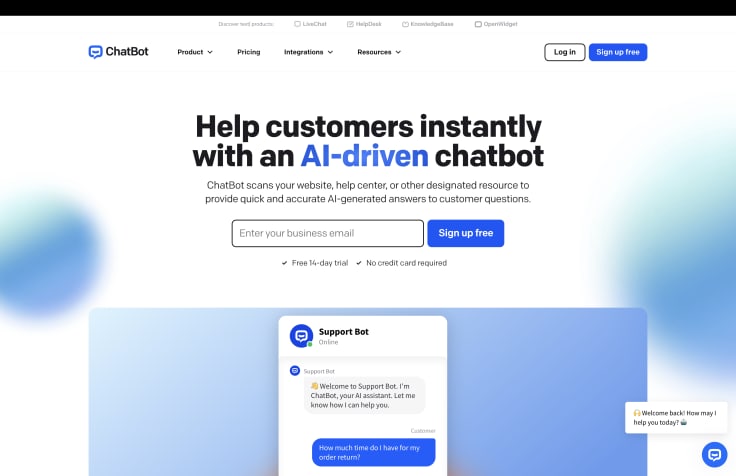
Key features
- Quick and accurate AI-generated answers: ChatBot's core strength lies in its ability to provide quick and accurate AI-generated responses to customer inquiries. The platform uses natural language processing (NLP) to understand and respond to customer questions in real time. This ensures customers receive timely and relevant information, significantly improving their satisfaction and engagement.
- No-coding chatbot setup: One of the standout features of ChatBot is its no-coding setup process. Businesses can create and deploy chatbots without programming knowledge, making them accessible to non-technical users. The drag-and-drop interface allows for easy customization, enabling businesses to tailor their customer service chatbots to meet specific needs and branding requirements.
- Faster 24/7 support: ChatBot's 24/7 support capability ensures that customers can get assistance anytime, day or night. This around-the-clock availability enhances customer service automation by providing immediate responses to inquiries, reducing wait times, and increasing overall customer satisfaction. Businesses can handle a higher volume of interactions without additional staff.
- No dependencies on third-party providers: Unlike many other chatbot solutions, ChatBot operates independently without relying on third-party providers such as OpenAI, Google Bard, or Bing AI. This independence ensures that ChatBot can deliver consistent and reliable performance, free from potential disruptions caused by external dependencies.
- Data security and privacy: ChatBot excels in data security and privacy. All data processed and hosted on the ChatBot platform is securely managed, ensuring that customer information remains confidential and protected. This commitment to data security makes ChatBot a trustworthy solution for small businesses prioritizing privacy.
User reviews and testimonials
ChatBot has received a large number of positive reviews from its users on various platforms. On G2, users praise its ease of use, powerful artificial intelligence capabilities, and excellent customer service. Reviews highlight how ChatBot has improved customer interactions, reduced response times, and increased efficiency. Also, users appreciate the platform's flexibility and the ability to customize chatbots to meet their unique business needs.
Comparison with Twilio
While Twilio offers rock-solid APIs for communication, ChatBot, with its AI-based chatbot technology, provides a more specialized solution for customer service. Both platforms have unique advantages, catering to different business needs and operational scales.
Twilio's versatility and developer focus
Twilio's range of capabilities can also be a double-edged sword. The platform's complexity often requires significant technical expertise and development resources. This can challenge smaller companies or those without a dedicated IT team. In addition, while Twilio's advanced features are attractive, the associated costs can quickly escalate, especially for businesses with a high volume of communications.
ChatBot's customer service excellence based on AI
Twilio alternative offers a more targeted and user-friendly solution designed specifically for customer service. Its AI-based technology excels at automating and providing quick and accurate responses to inquiries. One significant advantage of ChatBot is that no coding is required.
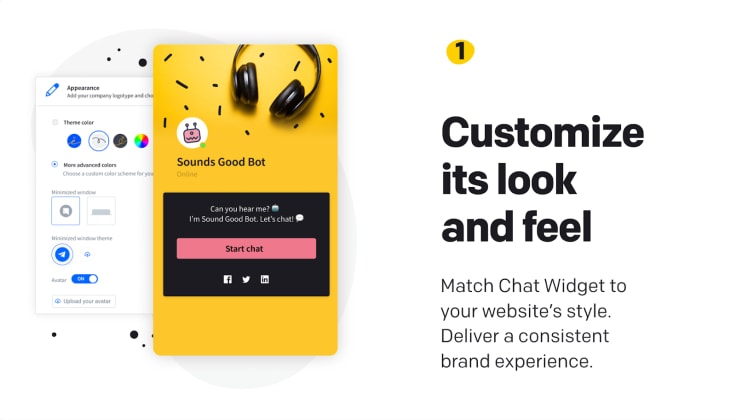
Key differences and advantages
- Specialization vs. versatility: Twilio's broad API offerings make it a versatile choice for developers needing a wide range of communication solutions. ChatBot, on the other hand, specializes in AI-driven customer support, offering a more focused and refined tool for this specific purpose.
- Ease of use: ChatBot's no-coding setup and intuitive interface are designed to be user-friendly, enabling businesses to implement and manage their customer support chatbots with minimal effort. Twilio's extensive capabilities require a higher level of technical expertise, which can be a barrier for some businesses.
- Cost efficiency: ChatBot is often more cost-effective, especially for small to medium-sized businesses, as it avoids the escalating costs associated with Twilio's communication volumes. This makes it an appealing choice for businesses with limited budgets.
- Support and integration: While Twilio offers solid support and integration options, ChatBot's dedicated customer support and seamless integration with various platforms provide a more consistent and reliable user experience.
Real-world use cases and success stories
A renowned global fashion retailer has integrated ChatBot technology into its online shopping platform to improve customer service. The bot was designed to handle various customer inquiries, such as product availability, order status, and return policies. It was accessible through the website and mobile app, providing customers with instant assistance and reducing the need for human intervention in resolving common issues.
The implementation led to a significant improvement. ChatBot handled many inquiries, allowing the support team to focus on more complex issues. As a result, customer satisfaction increased due to ChatBot's quick and accurate responses. Automating routine inquiries has reduced the burden on the customer support team, leading to operational cost savings. ChatBot's ability to provide 24/7 support also meant that customers could receive assistance anytime, improving the overall shopping experience.
This example illustrates how the successful implementation of ChatBot technology can lead to significant improvements in customer service, resulting in higher satisfaction, lower costs, and a more efficient use of human resources.
2. Vonage API
Vonage API, formerly Nexmo, is a comprehensive platform enabling businesses to integrate various communication channels into their applications. Focusing on voice, messaging, and video APIs, Vonage API provides solid solutions for boosting interactions with users and ensuring seamless communication.

Key features
- Authentication of APIs: One of the standout features of Vonage API is its authentication capabilities. The platform offers secure and reliable API authentication methods, ensuring only authorized users can access and interact with the communication media. This feature is crucial for maintaining integrity and security.
- Verification of number insights: Vonage API also excels in providing number insights, including phone number verification and validation. This feature allows businesses to ensure the accuracy of customer contact information, reducing the likelihood of fraud and enhancing the reliability of communication channels.
User reviews and ratings
Vonage API has received positive reviews from users for its reliability, ease of integration, and comprehensive feature set. On platforms like G2, users have praised the platform's ability to handle high communication volumes without compromising performance. The robust security features and extensive API documentation have also been highlighted as significant advantages.
Pros and cons
Pros:
- Rock-solid API capabilities: Vonage API offers a wide range of APIs for voice, messaging, and video, making it a versatile solution for various communication needs.
- Security and authentication: The platform's strong authentication features ensure secure and reliable communication.
- Ease of integration: Vonage API is known for its straightforward integration process, which is supported by extensive documentation and developer resources.
Cons:
- Cost: Like Twilio, Vonage API's pricing model can become expensive, especially for businesses with high communication volumes.
- Complexity: Vonage API's extensive features and capabilities can overwhelm new users, requiring a steep learning curve to fully utilize the platform.
Comparison with Twilio and ChatBot
Vonage API and Twilio offer similar, extensive communication solutions through SMS, voice, and video services, catering to developers who need customizable APIs. Vonage excels with its international reach and flexible pricing, while Twilio is known for its comprehensive API capabilities and seamless integration across platforms.
In contrast, ChatBot focuses on AI-driven customer support with a no-coding setup, providing immediate and accurate responses. ChatBot is the superior alternative for businesses looking to improve customer service quickly and cost-effectively without needing extensive technical resources.
3. Bandwidth
Bandwidth is a cloud communications platform that provides a range of communication interservices, including voice, messaging, and emergency services. Founded in 1999, Bandwidth has positioned itself as a reliable provider for businesses needing robust and scalable communication solutions. The platform is known for its comprehensive APIs that enable developers to seamlessly build, deploy, and manage communication applications.

Key features
- Call transcriptions: Bandwidth offers advanced call transcription services that convert voice calls into text. This feature is particularly useful for businesses that need to keep records of interactions, perform analysis, or comply with regulatory requirements. The transcriptions are accurate and can be easily integrated into existing systems for further processing.
- Text-to-speech: The text-to-speech feature allows businesses to convert written text into spoken words, enabling automated voice responses in customer service applications. This feature enhances engagement by providing a personalized touch in automated interactions and ensuring customers receive clear and accurate information.
- Call recording: Bandwidth's call recording capability is another significant feature that allows businesses to record customer calls for quality assurance, training, and compliance. The recordings can be stored securely and accessed as needed, providing valuable insights and helping improve service quality.
User reviews and ratings
Users have praised Bandwidth's reliability, high-quality voice services, and comprehensive API documentation. Reviews on platforms like G2 highlight the platform's robust call management features and the ease of integrating Bandwidth's services into existing systems. However, some users have noted that the platform's pricing for smaller businesses can be a bit high.
Pros and cons
Pros:
- Reliable voice services: High-quality voice communication with advanced features like transcriptions and recordings.
- Comprehensive API documentation: Detailed and helpful documentation makes integration straightforward.
- Scalability: Suitable for businesses of all sizes, capable of handling large volumes of communications.
Cons:
- Cost: This can be expensive, especially for small businesses with limited budgets.
- Complex setup: Initial setup and integration can be challenging without technical expertise.
Comparison with Twilio and ChatBot
Bandwidth's strength lies in its sound voice services and advanced features like call transcriptions and recordings. Twilio also provides similar capabilities across voice, SMS, and video APIs. Bandwidth's focused expertise in voice makes it a strong competitor in telecommunications.
ChatBot, beyond basic AI capabilities, integrates advanced features such as sentiment analysis and seamless omnichannel support. This allows businesses to provide tailored customer experiences across multiple communication channels without requiring extensive coding knowledge.
Unlike Bandwidth and Twilio, ChatBot's strength lies in its user-friendly interface and powerful AI technology that enhances customer engagement and operational efficiency.
4. Sinch
Sinch is a cloud-based platform that provides messaging, voice, and video services through a comprehensive suite of APIs. Established in 2008, Sinch is known for its powerful SDKs, which allow developers to integrate communication interservices into their applications easily. The platform is designed to be flexible and customizable, catering to various business needs.
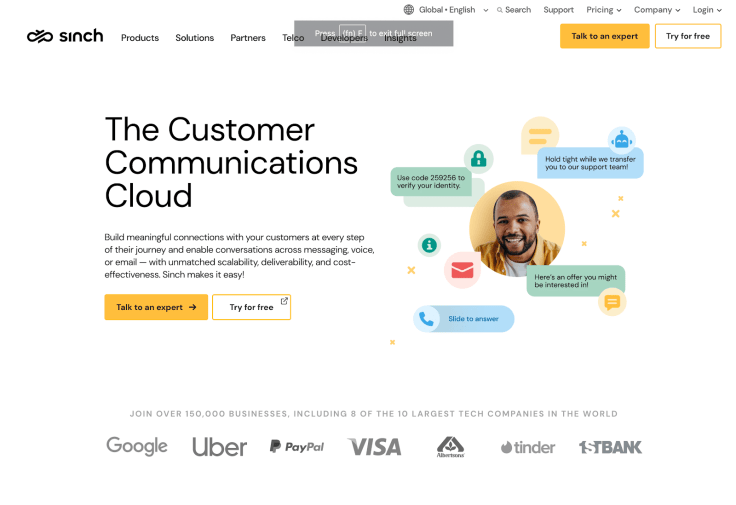
Key features
- SDK development: Sinch offers robust SDKs that enable developers to integrate messaging, voice, and video capabilities into their applications. These SDKs are designed to be developer-friendly, with detailed documentation and support, making it easy to build and deploy communication interservices.
- Flexibility in customization: One of Sinch's key strengths is its flexibility in customization. Businesses can tailor the communication interservices to fit their needs, whether adjusting the user interface or integrating with other business systems. This level of customization ensures that businesses can create unique and effective communication solutions.
User reviews and ratings
Sinch has received positive feedback for its flexible and powerful SDKs, which simplify the integration of communication interservices. Users on platforms like G2 appreciate the platform's customization options and the quality of its voice and messaging services. However, some reviews mention that the pricing can be prohibitive for smaller businesses.
Pros and cons
Pros:
- Developer-friendly SDKs: Easy to integrate with detailed documentation and support.
- Customizable: High flexibility allows businesses to tailor the services to their needs.
- Quality communication service: Reliable messaging, voice, and video capabilities.
Cons:
- Pricing: This can be expensive for small to medium-sized businesses.
- Complexity: The flexibility and customization options may require significant technical expertise to implement effectively.
Comparison with Twilio and ChatBot
Sinch and Twilio are leading players in communication APIs, emphasizing versatility and development tools for SMS, voice, and video services. Sinch stands out for its flexibility and focus on SDKs, ideal for developers looking for simple integration. Twilio, on the other hand, has a wide range of APIs and seamless integration capabilities.
ChatBot, on the other hand, specializes in an agile, no-coding configuration tailored for customer service automation. It also offers advanced natural language processing and multi-channel support integration, boosting user engagement and operational efficiency.
5. Telnyx
Telnyx is a Twilio alternative platform that offers a wide range of communication interservices, including voice, messaging, and networking APIs. Founded in 2009, it is known for its global reach and ability to provide reliable communication interservices across different regions. The platform is designed to be highly scalable, making it suitable for businesses of all sizes.
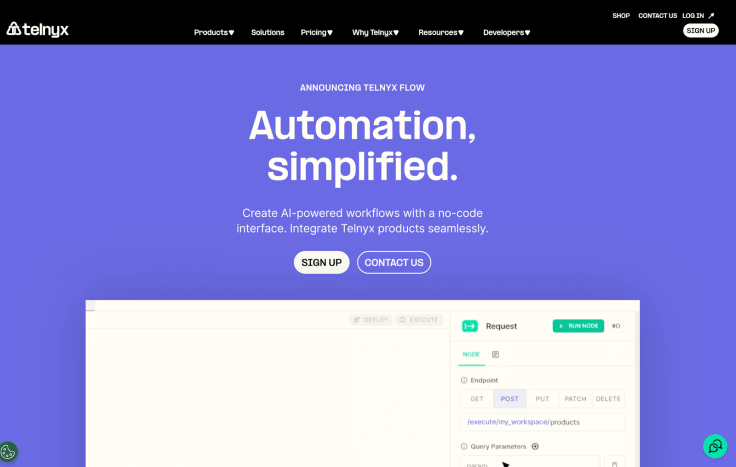
Key features
- Networking APIs: Telnyx offers powerful networking APIs that enable businesses to manage and optimize their communication networks. These APIs control routing, monitoring, and managing communication flows, ensuring efficient and reliable connectivity.
- Worldwide data transfer: Telnyx provides worldwide data transfer capabilities, allowing businesses to connect with customers and partners globally. The platform's infrastructure is designed to support high-speed data transfer across different regions, ensuring seamless communication.
User reviews and ratings
Telnyx has received favorable reviews for its reliability, global reach, and comprehensive API offerings. Users appreciate the platform's scalability and the quality of its networking services. However, some reviews mention that the platform's advanced features can be complex to set up and require technical expertise.
Pros and cons
Pros:
- Global reach: Reliable communication service with worldwide data transfer capabilities.
- Comprehensive networking APIs: Robust APIs for managing and optimizing communication networks.
- Scalability: Suitable for businesses of all sizes, capable of handling high communication volumes.
Cons:
- Complex setup: Advanced features can be challenging without technical expertise.
- Cost: Pricing can be high, particularly for businesses with extensive communication needs.
Comparison with Twilio and ChatBot
Telnyx offers similar communication services to Twilio, focusing on networking APIs and global data transfer. While Twilio provides a broad set of APIs, Telnyx stands out with its infrastructure and global reach. Compared to ChatBot, Telnyx focuses more on the backend communication infrastructure, while ChatBot specializes in AI-driven customer interactions.
Conclusion
Finding the right communication platform for your business can significantly impact customer engagement and satisfaction. While Twilio offers a robust suite of APIs, exploring alternatives to Twilio like ChatBot, Vonage API, Bandwidth, Sinch, and Telnyx can provide specialized features that better meet your specific needs.
ChatBot is the leading solution, offering AI-driven technology, no-coding setup, 24/7 support, and robust data security. Each alternative to Twilio has its strengths, so consider your business requirements and user reviews when choosing.
To experience the benefits of AI-driven interactions firsthand, start your free trial with ChatBot today and elevate your customer support operations to the next level.



